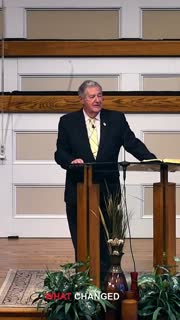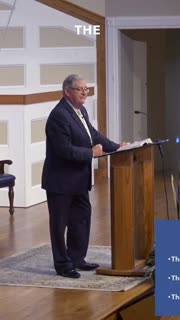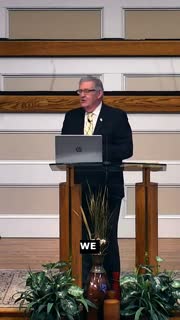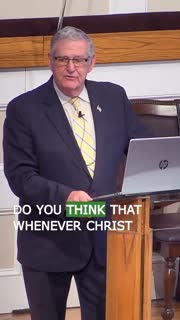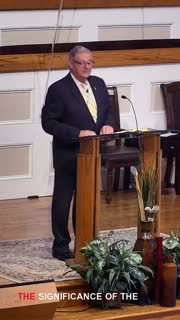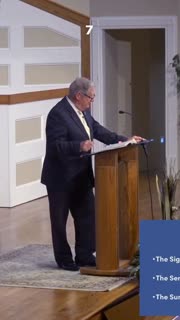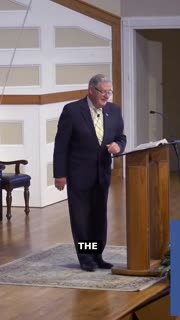The Deity of Jesus: Foundation of Our Faith
Devotional
Sermon Summary
Bible Study Guide
Sermon Clips
### Quotes for Outreach
1. "We live in a world that's filled with violence, hatred and a love for self. We live in a culture that has embraced the mind of Eve... But there is a policy there is a principle there when we call it the principle or the policy of Eve... God has provided for every one of their needs and he's given them the ability to make decisions... He comes to them every day and speaks to them in the cool of the garden in the cool of the day." [40:21] (105 seconds)
2. "What changed his mind on the road to Damascus? The gospel. What will change in your minds in our daily lives? What will change the way that we think? What will change what we do? What will change how we behave? What will change in our lives because of the good news that Jesus Christ, God in the flesh, came, born of a virgin, lived a perfect life in a world that hated him, in a world that despised him, in a world that didn't understand him, in a religion that could have cared less about him unless they only wanted to kill him." [01:07:37] (53 seconds)
3. "The good news is that our lives matter, our Christian life matters in our everyday life... He will be today and he will be tomorrow. By the way, he'll be there until the rapture takes place. So let's think the good news is that our lives matter, our Christian life matters in our everyday life." [01:00:49] (10 seconds)
4. "We worship Jehovah God, and he alone. What a biblical truth. What a fantastic place. We don't have to concern. We don't have to care. We don't have to be careful. We don't have to be consumed. We know for sure that our God is real. We know these things. What a biblical truth." [28:09] (27 seconds)
5. "Do you think that whenever Christ had this conversation with those disciples, do you think it changed what they thought? Do you think it changed how they lived? Do you think it changed their futures? I not only think so, I know it did. It'll do mine and yours too, if we'll allow it to. We thank the Lord for it this morning." [33:22] (26 seconds)
### Quotes for Members
1. "What do we believe about the deity of Jesus? I've said this in many different ways. There's a lot of religions out there, and in their belief system, they believe in Jesus. They do. They believe in Jesus. Listen, a lot of them that we call Christians in America today believe in Jesus, but do not believe that Jesus was the Son of God, and Jesus was God in the flesh. But we know from the scriptures that give us that knowledge and truth that he was." [28:43] (35 seconds)
2. "Paul said that's me. That's what he said. I just read it for you and that's what he said. He said called to me an apostle separated on the gospel of God then he says in verse 6 among whom are ye also of Jesus Christ so the gospel is not only important in our local church as we send missionaries around the world to spread the gospel and bring others unto the saving knowledge of the Lord Jesus Christ you and I are called to be significantly impacted by the gospel there's a truth to that." [59:11] (40 seconds)
3. "The significance of the gospel is amazing. Paul here gives us two or three different things I'm going to read them with you this morning in the epistle of the apostle to the Romans he is separated in the gospel look at verse 2 which he had promised to forby his prophets in the holy scriptures Paul is a student of the Old Testament he knows exactly Romans 3.15 great text he knows exactly Isaiah 9 he knows exactly the number of scriptures in the Old Testament that prophesy and promise the Messiah will come and what he will do and what he will do." [57:14] (45 seconds)
4. "The significance of the gospel and the servant of the gospel listen to what Paul tells him we don't have much here but I want to share it with you Paul says in verse 7 to all that be in Rome beloved of God called to be saints to be saints grace to you and peace from God our Father and from the Lord Jesus Christ look at verse number 8 he said first I thank my God through Jesus Christ for you all that your faith is spoken of throughout the whole world." [01:03:26] (-733 seconds)
5. "The significance of the gospel then I want to talk about the servant of the gospel Paul says this he said Paul a servant of Jesus Christ servant how you know when I read 1 Timothy 2 Timothy when I read that how many of us we're still serving ourselves I don't feel like it I don't feel good today I think I said this probably on Wednesday night or maybe one other time how many of us pick up our phone in the morning and check the weather listen I check the weather in India I check some of you I check the weather in Sikkim I check the weather in Ghana I check the weather in Sierra Leone I check the weather in Danville I got kids that live there it's here." [01:01:53] (59 seconds)
Ask a question about this sermon
1. "We live in a world that's filled with violence, hatred and a love for self. We live in a culture that has embraced the mind of Eve... But there is a policy there is a principle there when we call it the principle or the policy of Eve... God has provided for every one of their needs and he's given them the ability to make decisions... He comes to them every day and speaks to them in the cool of the garden in the cool of the day." [40:21] (105 seconds)
2. "What changed his mind on the road to Damascus? The gospel. What will change in your minds in our daily lives? What will change the way that we think? What will change what we do? What will change how we behave? What will change in our lives because of the good news that Jesus Christ, God in the flesh, came, born of a virgin, lived a perfect life in a world that hated him, in a world that despised him, in a world that didn't understand him, in a religion that could have cared less about him unless they only wanted to kill him." [01:07:37] (53 seconds)
3. "The good news is that our lives matter, our Christian life matters in our everyday life... He will be today and he will be tomorrow. By the way, he'll be there until the rapture takes place. So let's think the good news is that our lives matter, our Christian life matters in our everyday life." [01:00:49] (10 seconds)
4. "We worship Jehovah God, and he alone. What a biblical truth. What a fantastic place. We don't have to concern. We don't have to care. We don't have to be careful. We don't have to be consumed. We know for sure that our God is real. We know these things. What a biblical truth." [28:09] (27 seconds)
5. "Do you think that whenever Christ had this conversation with those disciples, do you think it changed what they thought? Do you think it changed how they lived? Do you think it changed their futures? I not only think so, I know it did. It'll do mine and yours too, if we'll allow it to. We thank the Lord for it this morning." [33:22] (26 seconds)
### Quotes for Members
1. "What do we believe about the deity of Jesus? I've said this in many different ways. There's a lot of religions out there, and in their belief system, they believe in Jesus. They do. They believe in Jesus. Listen, a lot of them that we call Christians in America today believe in Jesus, but do not believe that Jesus was the Son of God, and Jesus was God in the flesh. But we know from the scriptures that give us that knowledge and truth that he was." [28:43] (35 seconds)
2. "Paul said that's me. That's what he said. I just read it for you and that's what he said. He said called to me an apostle separated on the gospel of God then he says in verse 6 among whom are ye also of Jesus Christ so the gospel is not only important in our local church as we send missionaries around the world to spread the gospel and bring others unto the saving knowledge of the Lord Jesus Christ you and I are called to be significantly impacted by the gospel there's a truth to that." [59:11] (40 seconds)
3. "The significance of the gospel is amazing. Paul here gives us two or three different things I'm going to read them with you this morning in the epistle of the apostle to the Romans he is separated in the gospel look at verse 2 which he had promised to forby his prophets in the holy scriptures Paul is a student of the Old Testament he knows exactly Romans 3.15 great text he knows exactly Isaiah 9 he knows exactly the number of scriptures in the Old Testament that prophesy and promise the Messiah will come and what he will do and what he will do." [57:14] (45 seconds)
4. "The significance of the gospel and the servant of the gospel listen to what Paul tells him we don't have much here but I want to share it with you Paul says in verse 7 to all that be in Rome beloved of God called to be saints to be saints grace to you and peace from God our Father and from the Lord Jesus Christ look at verse number 8 he said first I thank my God through Jesus Christ for you all that your faith is spoken of throughout the whole world." [01:03:26] (-733 seconds)
5. "The significance of the gospel then I want to talk about the servant of the gospel Paul says this he said Paul a servant of Jesus Christ servant how you know when I read 1 Timothy 2 Timothy when I read that how many of us we're still serving ourselves I don't feel like it I don't feel good today I think I said this probably on Wednesday night or maybe one other time how many of us pick up our phone in the morning and check the weather listen I check the weather in India I check some of you I check the weather in Sikkim I check the weather in Ghana I check the weather in Sierra Leone I check the weather in Danville I got kids that live there it's here." [01:01:53] (59 seconds)

